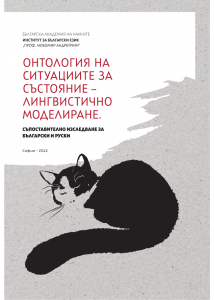Инфинитивные и финитные сентенциальные зависимые в русском языке и их соответствия с союзами че и да в болгарском языке
Infinitive and finite complement clauses in Russian and their correspondences with the complementizers че and да in Bulgarian
Author(s): Alexander Letuchiy, Marina Dzhonova
Subject(s): Language studies, Language and Literature Studies, Theoretical Linguistics, Applied Linguistics, Morphology, Syntax, Lexis, Semantics, Comparative Linguistics, Cognitive linguistics, Descriptive linguistics, Eastern Slavic Languages, South Slavic Languages, Phraseology
Published by: Институт за български език „Проф. Любомир Андрейчин“, Българска академия на науките
Keywords: modal verbs; phase verbs; predicatives; infinitive; tense; irreality; partial control; split control; strict control; co-reference
Summary/Abstract: The article compares the distribution of complementation strategies in Bulgarian and Russian. In Russian, the opposition of finite complements (introduced primarily by что and чтобы) is opposed to infinitive complements. In the default case, the former do not mark co-reference, while the latter are used in contexts involving co-reference between the main and the embedded clause arguments, although this is not always the case. Bulgarian lacks infinitives, thus, it has no non-finite complement forms. However, the infinitive functions are, to a great degree, fulfilled by да-complements, as opposed to че-complements. The significant differences observed in the data are due to the presence of the finite verb in the complement clauses introduced by the complementizer да. As we demonstrate, the opposition between что / чтобы and the infinitive in Russian and the difference between че and да in Bulgarian have a lot in common, although only Russian infinitive clauses are non-finite in the strict sense. To demonstrate this, we examine the relation between various strategies of complementation, co-reference and tense, and show how different complement types exhibit non-standard types of syntactic control.
- Page Range: 485-509
- Page Count: 25
- Publication Year: 2022
- Language: Russian
- Content File-PDF

